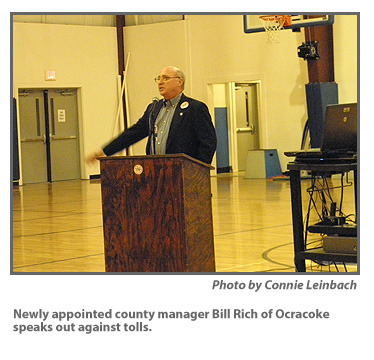Eliminate all tolls on ferries in North Carolina is the new rallying cry for Ocracoke and other coastal areas that have access by ferries.
That was the message Wednesday night, Nov. 13, during a public hearing in the Ocracoke School gym on the state legislature’s quest to raise $5 million in revenue, up from $2 million last year, in the state Department of Transportation Ferry Division budget. The hearing was conducted by employees of the NCDOT. Although no legislators attended, about 160 Ocracoke residents did.
Jamille Robbins, senior public involvement officer for NCDOT, conducted the hearing. He said the DOT came up its recommended tolling plan in response to the legislators’ adoption of a new resolution in January directing the division to establish ferry tolls.
This resolution is a continuation of the action in 2011 when the General Assembly mandated the ferry division to increase ferry toll revenue. Former Gov. Bev Perdue ordered a one-year moratorium on this mandate, which expired in January.
The DOT’s plan outlined Wednesday night would raise fees on the Swan Quarter and Cedar Island ferries by more than twice the current price, including a $5 fee for all passengers.
Attendees at Wednesday evening’s hearing said eliminating all ferry tolls would attract more tourists to the coastal areas which would translate into more business and more tax revenues.
“This is bad legislation that taxes people and doesn’t raise revenue,” said Greg Piner, a Pamlico County resident who traveled to Ocracoke to attend the hearing. “We don’t need tolls at all. It costs $1 million to raise $2 million in tolls.”
The gasoline tax hits everyone and should suffice for transportation costs, several speakers pointed out. Why not raise that tax by a fraction?
“If they were serious about raising the gas tax, it would go up one tenth of one percent and would cost the average North Carolinian $.75 a year,” Piner said.
Piner revealed that representatives Paul Tine, a Democrat who represents several coastal counties, including Hyde and Dare and Charles Jeter, a Republican from Charlotte are planning to introduce legislation to eliminate all the tolls.
We need to look at the ferry system as an asset, not as a burden, said Frank Brown of Ocracoke.
“The ferries contributed $320 million in tourism revenue,” he said. He questioned why there had not been a long-term study as to the economic impact that raising tolls would have on the island economy.
“If we were a bird or a turtle, you bet there would have been a study,” he said, receiving applause.
Ridership has gone down drastically in recent years, noted Jerry Gaskill of Cedar Island, who is a former director of the Ferry Division.
“The money it takes to collect the tolls would be better used for advertising for tourists,” he said. “If we continue to raise tolls, we won’t have anything here.”
Rudy Austin, president of the Ocracoke Civic and Business Association, noted that many who grew up here several decades ago had to go off the island to get jobs.
“When I grew up there was no ferry,” he said. “The ferry has enabled us to have the community we have here.”
“Our lives depend on the DOT assets,” added Tom Pahl, who also pointed out that the chairman of the House Transportation Committee lives on Oak Island, where he can go without paying a toll.
“Should the people on Ocracoke be treated any differently than the chairman of the House Transportation Committee?” he asked.
Clayton Gaskill, vice president of the OCBA, noted that it’s wrong to think of the ferry system as a profit center instead of a service to the people.
“An increase in ferry tolls can’t help but have a negative effect,” he said.
The engineer who conducted a survey last year for the DOT, Will Letchworth of CDM Smith, Raleigh, was at the meeting and confirmed that his research showed that the state would incur costs to build the infrastructure needed to collect tolls on untolled ferries and that there would be a decrease in ridership if tolls were raised.
“Yes, there will be a decrease in tourists and revenues,” Letchworth said. “That has been reported back to the Legislature.”
Newly appointed Hyde County manager Bill Rich of Ocracoke pointed out that the approximately 150 businesses in the county depend on tourism, which is the biggest industry in the county.
Moreover, making county service employees and school buses pay a toll along with passenger fares will increase the already tight county and school district budgets, noted both Megan Shaw, information officer for the county, and Dr. Randolph Latimore, superintendent of Hyde County Schools.
“We are against all ferry taxes—period,” said Henri McClees, one of a team of lobbyists hired by Hyde, Beaufort and Pamlico counties to represent the coast in Raleigh. “The legislature is the problem and the legislature is the solution. You need to bombard them with e-mails that we will not tolerate this.”
Henri and her husband, Joe, are the lobbyist team.
“The enemy is not the DOT,” Joe McClees said. “The enemy is the ignorance in the legislature. If you really love where you live, you need to take action.”
One third of the House legislators are new to their jobs, Henri said.
“We do have good legislators who understand the issue and are fired up, but we need to educate the others about the coast,” she said.
An Ocracoke group is organizing under the OCBA to continue to rally residents to respond to this issue. A meeting will be held tonight at 7 p.m. in the Community Center to organize Ocracoke’s response.









